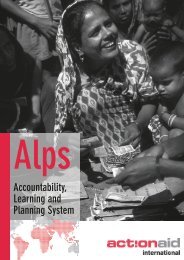A fair chance - United Nations Girls' Education Initiative
A fair chance - United Nations Girls' Education Initiative
A fair chance - United Nations Girls' Education Initiative
You also want an ePaper? Increase the reach of your titles
YUMPU automatically turns print PDFs into web optimized ePapers that Google loves.
fewer resources, offer fewer hours of instruction, andattain far worse results, than schools in moreaffluent areas. All schools need a trained, motivatedteacher who turns up every day to teach, and enoughbooks and desks to go around. Construction of safeand private toilet facilities for girls should bemandatory. Strong sanctions against the sexualabuse and harassment of girl pupils must be enactedand enforced.A first priority should be improving the status, payand support of teachers, especially those teachersposted to rural or ‘difficult’ areas. Long-standingquotas for gender parity among rural teachers shouldbe backed up with efforts to extend and improveteacher training facilities in the rural as well as theurban areas, and additional incentives and careerdevelopment opportunities for female teacherswilling to take up posts in the rural areas.While learning outcomes are unacceptably low inmany countries, it is essential that reforms are rootedin the local realities. Traditional chalk and talkteaching methods have been justifiably criticised, butthe experience of the last 20 years shows that attemptsto import learner-centred learning methodologieswithout taking local cultures into account have oftenbeen problematic.4) Encourage a range of education provisionThe scale and urgency of the action necessary to meetthe 2005 goal makes it essential that NGOs arestrongly supported in playing a complementary rolein developing sustainable education provision. Sadly,not every country has an NGO of the size and vision ofBRAC in Bangladesh, but much more can be done toexpand and mainstream the provision by NGOs ofbasic education, especially to hard-to-reach groups.These schools need to develop clear ‘pathways’ andlinkages with the formal system so that the nonformalsector does not become a ‘ghetto’ for girls andpoor students. Greater flexibility is needed so thateventual transfer to state schools is facilitated andencouraged. Some of the new, wide-rangingeducation sector development plans, currently beingrolled out in many countries, do not pay enoughattention to this key role of NGOs, nor have NGOsbeen sufficiently involved in the design andmanagement of these sector plans.5) Engage with civil societyExperience shows that a top-down approach to girls’education is not only ineffective, it may createresistance and resentment that will ultimately becounter-productive – a leading cause of‘implementation failure’ in girls’ education(Ramachandran 1998). Acting with urgency mustnot be confused with acting in haste, or used as anexcuse for shutting out the participation of parents,teachers and gender experts in designing reforms.This is especially crucial because of the social andcultural complexity that surrounds girls’ education:‘Behind the hype lies a cauldron of considerations thatconstitute today’s discourse around girls’ education:parental perceptions on the benefits of educating girls,changing social network support systems affecting girls’participation and persistence in school, and overcomingbarriers to women’s leadership.’ (Mali report).The participation of communities, teachers andwomen’s groups in the policy-making process iscrucial to developing appropriate, well-informedresponses to local complexities, and generating thebroad-based support needed to implement themsuccessfully.However, as the UK government has recognised increating the Commonwealth <strong>Education</strong> Fund, effectivegender advocates do not simply appear from nowhere.Governments and donors must open the door torobust and regular exchange with civil society groups,instead of the usual one-off ‘consultations’; they mustalso provide timely access to information and supportcivil society efforts to build advocacy skills.6) Break the glass ceilingExpanding primary school opportunities for girls isobviously a first priority for the countries furthest off47
















